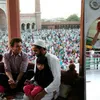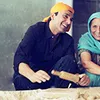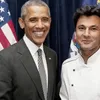In Michelin-star chef Vikas Khanna’s mission to feed millions in India, failure is not an option
Chef, filmmaker, author, and humanitarian Vikas Khanna has served nearly 10 million meals to the underprivileged in at least 125 cities and towns across India in just two months through his Feed India drive during the ongoing coronavirus pandemic.

Michelin-star chef, author, filmmaker, and humanitarian Vikas Khanna
It’s 4 am in New York. The city is slowly rising from its slumber, save perhaps for one lone man – chef, author, and filmmaker Vikas Khanna – who hasn’t slept a wink.
Even at dawn, Vikas sits hunkered over his laptop, going through swathes of Excel sheets, only to be interrupted by the sound of WhatsApp message notifications or video calls from India, where it’s still day. Sleep has evaded Vikas ever since he vowed, two months ago, to not rest until he has done everything in his power to feed the hungry in India during the ongoing coronavirus pandemic.
“We cannot fail. People need food now. So, we just cannot afford to fail,” Vikas tells me emphatically over the phone from New York.
It is this sense of urgency that keeps him up.
To be precise, Vikas has only taken short naps since April, when he galvanised a country-wide initiative called Feed India to distribute both cooked meals and dry rations to the less privileged and vulnerable communities in his home country.
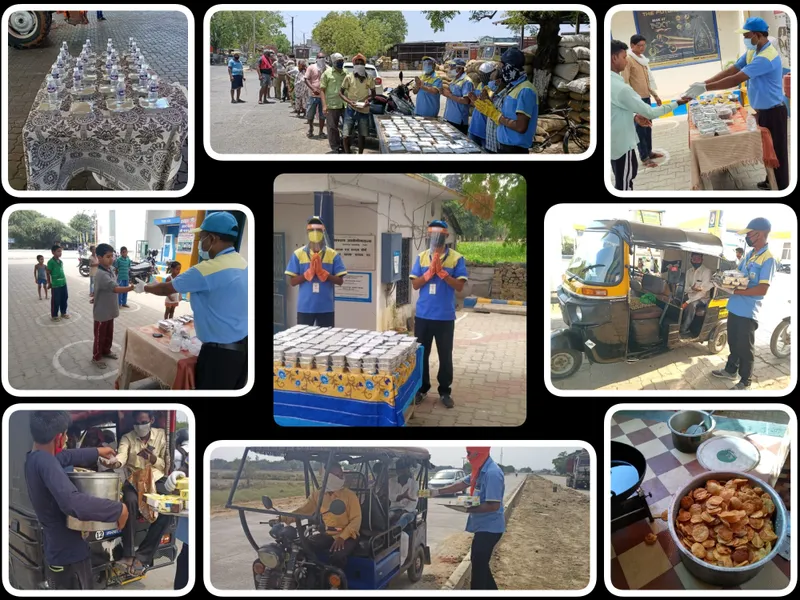
Vikas Khanna's Feed India drive has served nearly 10 million meals. Each meal is served with dignity
After India went into nationwide lockdown in late March, Vikas was convinced that hunger would soon become rampant as the less privileged begin to feel the full impact of the complete shutdown in economic activity.
Sitting in his apartment in New York, Vikas began sending out requests on social media asking people to connect him with those most in need of food and dry rations. They did, and thus started a movement that began as an individual effort but soon transformed into a growing tribe of like-minded humanitarians.
As of June 6, Vikas’s #FeedIndia drive has served nearly 10 million meals to the underprivileged in at least 125 cities and towns across India in just two months. In addition, Vikas has distributed thousands of hygiene kits, sanitary napkins, masks, and slippers to the impoverished across the country.
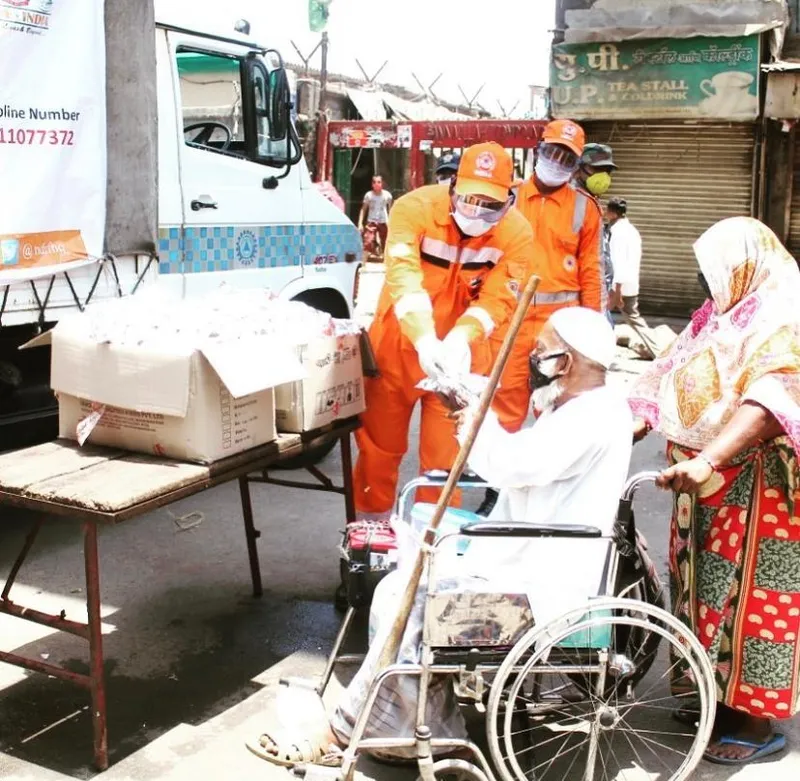
Vikas Khanna organised the world's largest Eid feast, where he provided more than 200,000 Eid feast kits
His initiative has helped people in old-aged homes, leprosy centres, orphanages, and slums; turned 58 fuel stations across the Uttar Pradesh-Maharashtra highway into food stations serving cooked meals for hungry migrants, and; fed thousands of migrants travelling by the Shramik trains being run by the government to take people stranded in the metros back to their homes.
Vikas tells me he was able to do all this with the help of the National Disaster Response Force (NDRF) executing delivery efforts on the ground as well as the support of like-minded volunteers, corporates, and non-governmental organisations.
“The NDRF and Satya-ji, who leads them, are the true heroes. They’ve been with me 24/7, working tirelessly and selflessly on these projects,” Vikas says, referring to Mr. Satya Narayan Pradhan, Director General of the NDRF.
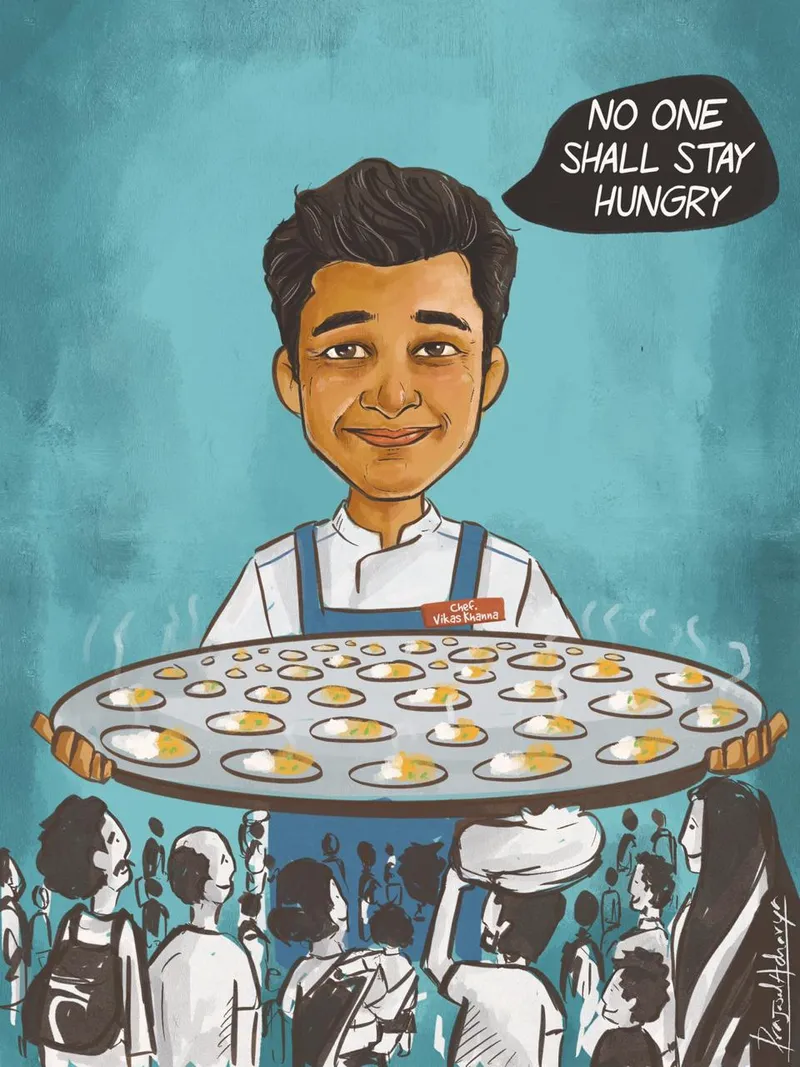
Illustration by Prajwal Acharya
Quitting is not an option
Vikas first reached out to Satya Narayan Pradhan in early April after he experienced his first ‘failure’ on this project. At the time, Vikas had been distributing food and dry rations to elder-care homes, orphanages, and leprosy centres, when a truck full of dry rations intended for an elder-care home in Bangalore, Karnataka, had disappeared with no means for Vikas to track down its driver.
In despair, Vikas had called his mother, Bindu Khanna, who lives in his hometown in Amritsar, Punjab. Lamenting that he had failed the very people he had promised to help, Vikas told his mother he would have to give up because there was no way for him, sitting miles away in the US, to ensure the deliveries reached the intended beneficiaries. It was simply a logistical nightmare.
But Vikas’s mother would hear none of that. She told him that giving up was not an option. Instead, she advised Vikas to use his privilege and position to turn things around in his favour.
“For almost 50 years, I trained you in gurudwaras and elsewhere. Not so you can take selfies sitting at home. I trained you so you can feed my country in times like this. I don’t want any excuses. Stand up. However you can help, you will help. You will not give up,” Vikas’s mother had told him that fateful day on April 11.
“That’s why, in her honour, I’m not giving up any second,” Vikas tells me.
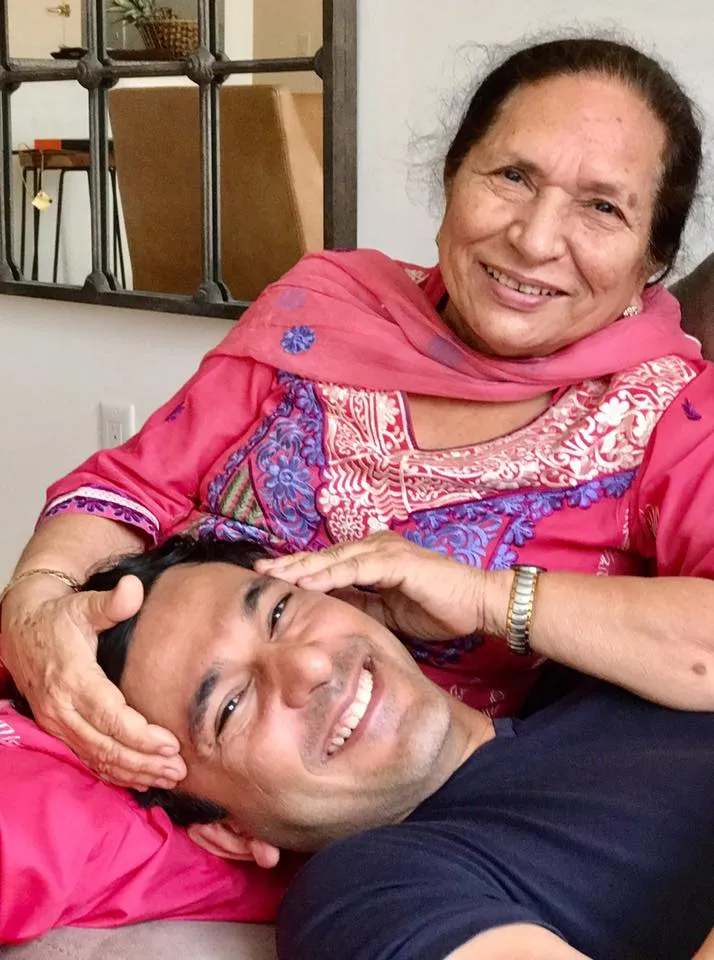
Vikas Khanna with his mother Bindu Khanna
Collaborating with the NDRF
Shortly after his conversation with his mother, Vikas reached out to the NDRF chief to enlist his team’s help to execute the delivery and distribution efforts on the ground. Satya-ji agreed, saying the NDRF would provide its assistance and support wherever its battalions were present.
And so, by mid-April, the NDRF came on board, starting distribution work in the Ghaziabad region, followed by Hyderabad and then Mumbai. After that, more cities and more towns were rapidly added, the NDRF chief tells me.
Along with the NDRF, many foundations, non-governmental organisations, and corporates – including India Gate, Daawat, ,, , Patanjali Ayurveda, and Godavari Biorefineries, among others – expressed their solidarity and support.
Ever since the NDRF and the first corporate partners came on board, there’s been no looking back for Vikas in his mission to feed millions impacted by coronavirus-induced lockdown. Since then, failing was out of question.
“We used to fail too many times in the beginning and there were too many delays due to the lockdown and other logistical issues. Sometimes when we’re distributing food to some people on the streets or to some communities, they tell us that it's been almost three days since they’ve had a proper meal. People need food now. That’s why, everything we do runs through a rapid pilot test, because we cannot fail,” Vikas says.
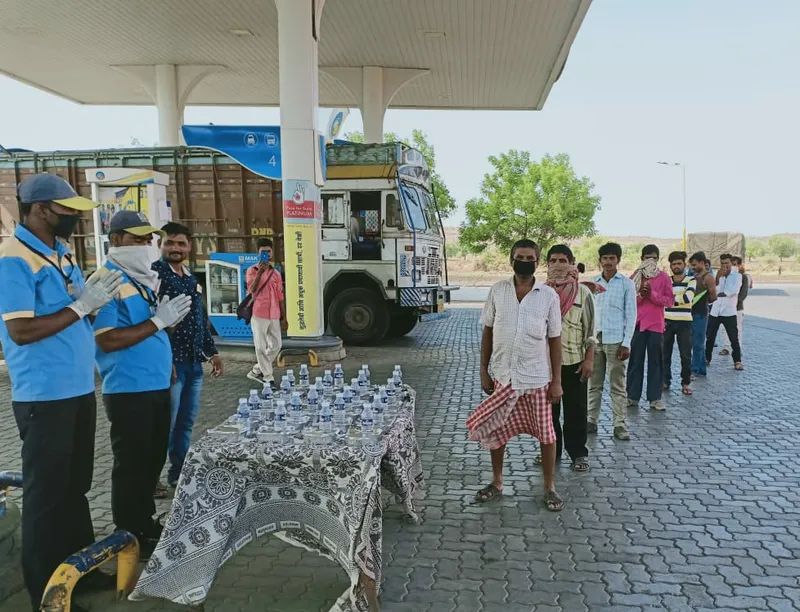
Around 58 fuel stations on the UP-Maharashtra highway have been turned into food stations where cooked meals are served to hungry migrants as part of Vikas Khanna's Feed India drive
The power of dignity, precision
Vikas runs the Feed India drive much like a Masterchef runs his kitchens and his restaurants.
Each meal is served with the dignity, style, and precision that lends credence not only to Vikas’s celebrated masterchef status, but also to his deeply humanitarian side.
The same is true for his other initiatives as well.
For example, the ongoing Slipper Drive was started after Vikas was deeply moved when he saw a picture of a barefoot child who had come to collect food.
He immediately sprang into action, coming up with the idea to carry slippers in the NDRF food trucks, so that each time they come across a barefoot person or child, they can provide them with slippers too. Now, in just over a week’s time, more than 12,500 slippers have been distributed through this drive.
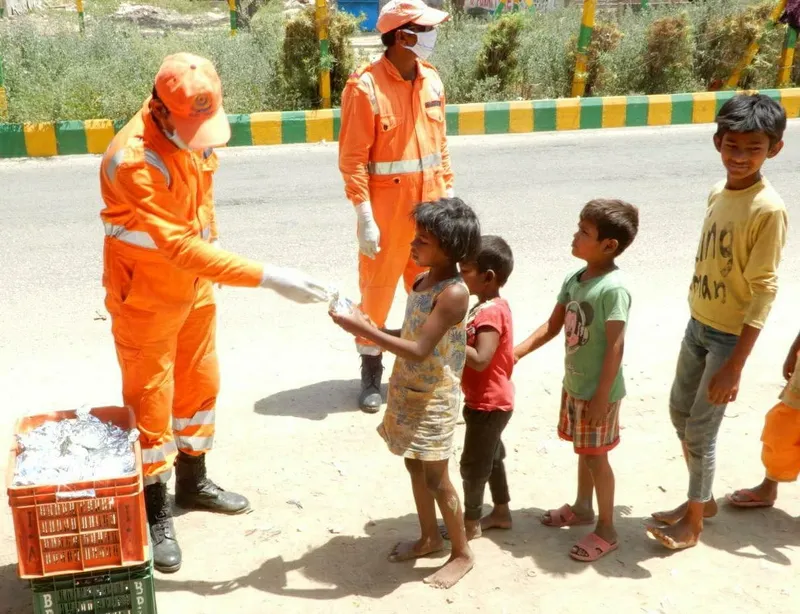
Vikas Khanna was so deeply moved by this picture of a barefoot child that he started a Slipper Drive, through which he has distributed more than 12,500 slippers so far
Just as speed of delivery is important, so too is accountability and attention to detail.
In fact, this is also what keeps him up night and day – literally.
At night, Vikas coordinates the distribution of cooked meals and dry rations happening thousands of kilometres away in different corners of his home country where it’s day.
And during the day, when he finally finds some quiet time to himself, he plans ahead for the next day and prepares meticulous reports to account for almost every request received.
To be sure, just as in a kitchen, Vikas ensures every new initiative is tested before its actual execution.
“For us to do anything, whether it’s the fuel stations or the trains, we do a pilot run. Because we run the risk of failing too fast if we don’t do a proper pilot run,” Vikas tells me.
When the Feed India drive first expanded to include migrants returning home on the Shramik Trains, Vikas’s team on the ground initially failed to distribute the food evenly to everyone because they were unable to control the hungry crowd.
Frustrated, Vikas reached out to Satya-ji again for help; in no time, the NDRF was roped in, but before they could formally start the food distribution in trains, they conducted a pilot run.
The pilot, which was conducted at the Mughalsarai railway station in Uttar Pradesh, was a success. “Everything happened like clockwork,” Satya-ji tells me.
The NDRF coordinated with the railway authorities, and by emphasising the priority of feeding the migrants, ensured the trains did not leave until the last person onboard had been fed.
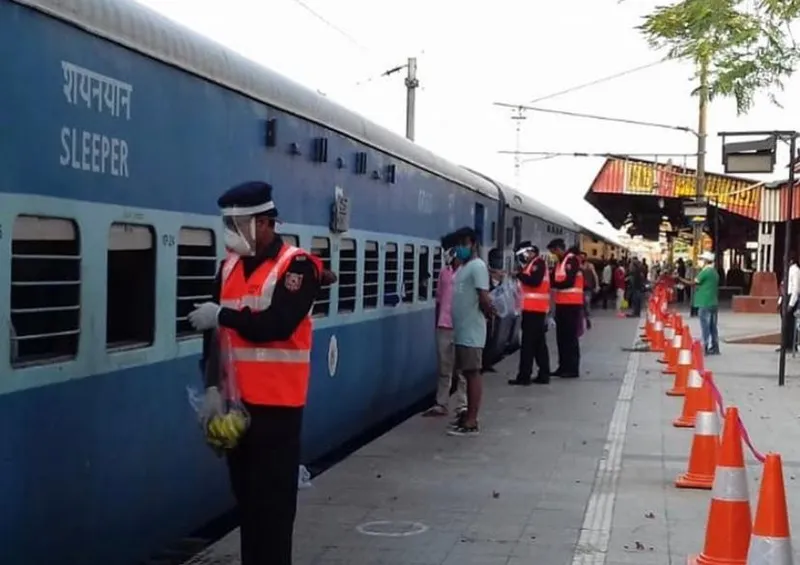
The NDRF distributing food to the migrants travelling by the Shramik trains as part of Vikas Khanna's Feed India drive
Barkat: world’s largest food drive in a single day
Now Vikas’s team on the ground, with the help of the NDRF, is readying for the world’s largest food drive in a single day: to provide more than two million meals in one day to the differently-abled, transgenders, sex workers, AIDS patients, orphans, and the elderly in old-aged homes in the Delhi-NCR area.
The team will provide rice, oil, salt, sugar, spices, wheat flour, onions, potatoes, and other dry rations. In the past few weeks, the NDRF has been collecting more than 10,000 bags of each of these different items in the Ghaziabad cantonment.
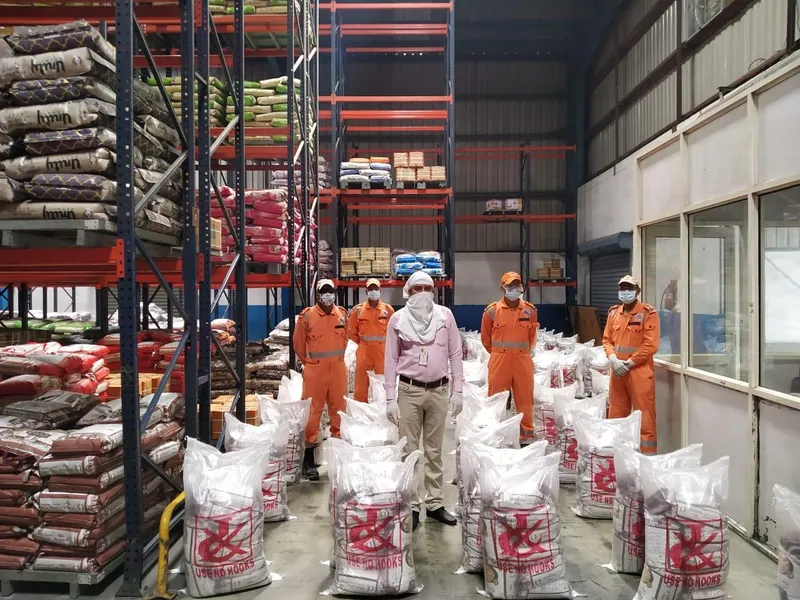
Preparations for Barkat, the world's largest food drive in a single day, where more than two million meals will be served in one day to vulnerable communities
Originally intended to be a project to provide one million meals a day, the initiative has since doubled, thanks to an outpouring of support and contributions from corporates across the world. At last count, the collections had exceeded two million meals.
Vikas has rightly named the initiative Barkat, a word his grandmother loved and used frequently as it describes how ‘pure intentions result in pure magic.’
Vikas’s grandmother, or Biji as she was lovingly referred to, has been the greatest influence in his life, inspiring his passion for food and instilling in him the values of kindness and generosity.
“I always say that the luckiest kids are the ones raised by their grandparents. If my grandmother was not my influence, I’m sure I would be sitting in my most privileged life in America and thinking only about myself. It is because I was raised by the values instilled in me by my grandmother that I am able to do this and be constantly aware of the suffering around me,” Vikas says.
That’s perhaps why, for Vikas, the Feed India drive is as much an initiative in her memory, as it is in honour of everyone who has ever been kind to him. It’s as if all those people who had helped him in the past had done so, so that he could rise to the occasion in a time of crisis like this, Vikas tells me.
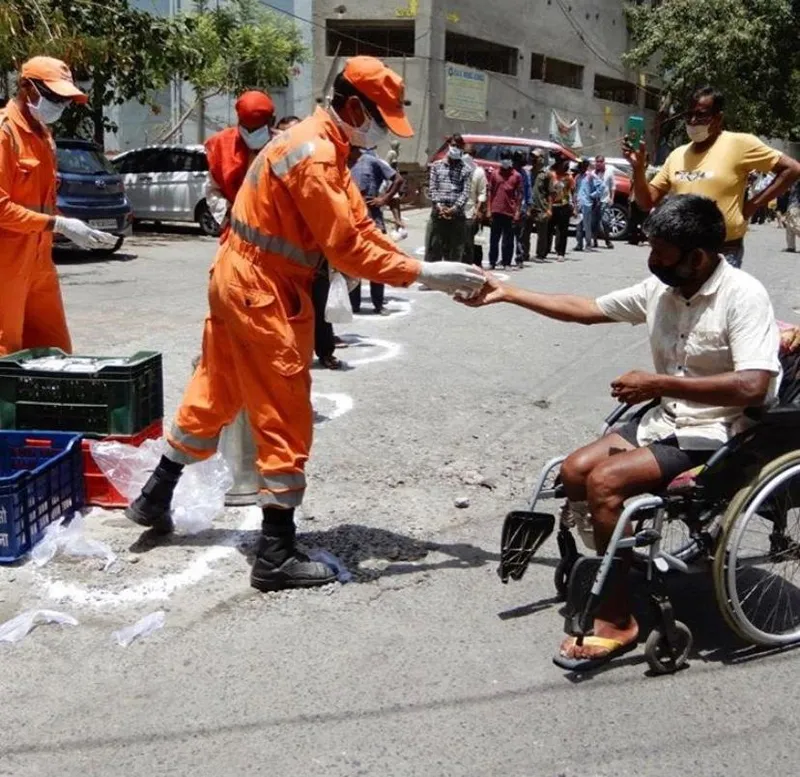
Vikas Khanna's Feed India campaign has provided nearly 10 million meals to people in 125 cities and towns across India in just two months
In honour of the many faces of kindness
And so, each meal, each act of compassion, and each gesture of generosity is in honour of everyone who showed Vikas the many faces of kindness, starting, of course, with his grandmother, his mother, and the Muslim lady who saved his life during the 1992 riots in Mumbai and who he lovingly calls Ammi.
In Ammi’s honour, Vikas organised the world’s largest Eid feast drive last month, providing more than 200,000 people in Mumbai with feast kits just a day before the end of the holy month of Ramadan. Even today, he recalls Ammi’s act of bravery with profound gratitude.
“She’s somebody who risked her own life by protecting me in her house for two days. Remember, when you have two young daughters in the house, you don’t let a strange boy inside, and that too from a different caste and religion, and at such a time. Everything was working against me but for one woman who believed she needed to protect me,” he says.
Vikas has never forgotten Ammi’s kindness and since 1992, has always observed a day of fasting during Ramadan in her honour. Neither has he forgotten the boatman in Varanasi, who offered him words of comfort when he had made the ritual journey to the Ganges after his father had passed.
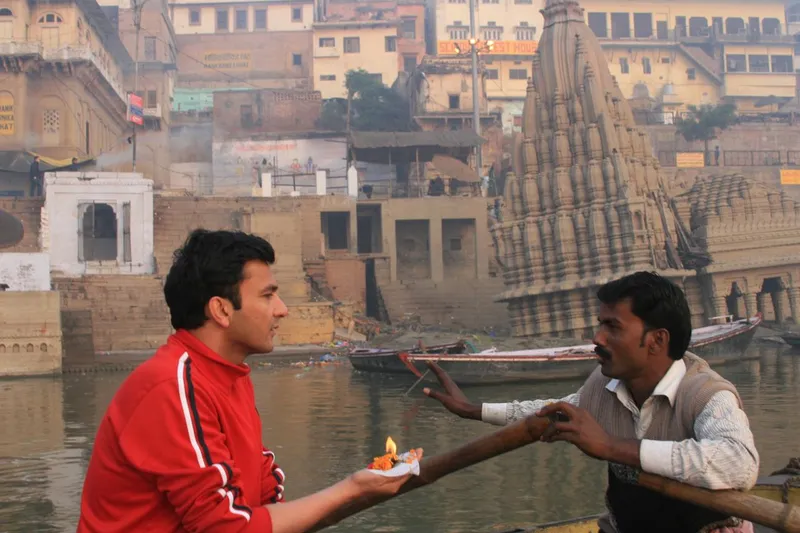
Vikas Khanna with the boatman who offered him words of comfort when he made the ritual journey to the Ganges after his father passed
And true to Vikas’s style, he found a way to honour the boatman’s kindness too during this crisis.
Sometime in May, as Vikas was going through a few of his things, he came upon a prized silk scarf or katag, that His Holiness the Dalai Lama had given him a few years ago. That day, Vikas placed the katag near his bed and sent a silent prayer to His Holiness, asking him for his guidance in this endeavour.
That morning, Vikas dreamed of the boatman from the Ganges, he tells me, adding that he saw the boatman as clear as day. The next day, Vikas found himself thinking about the boatman and wondering about his plight during this time of crisis. He then shared a picture of the boatman on social media asking people to help find him.
Within hours, he was able to not only trace the boatman and but also organise food and dry rations to be distributed to him and his entire community of boatmen – all of whom had been left with no source of income during the nationwide lockdown.
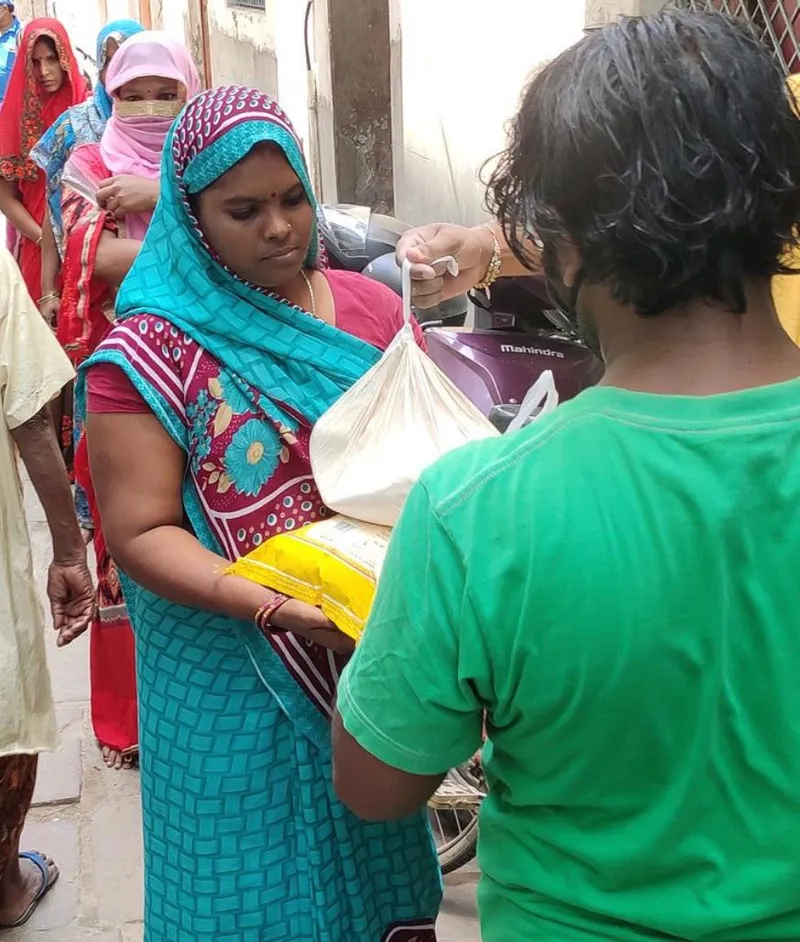
Vikas Khanna's team providing food and dry rations to the entire boatmen community
“Many people who work with me say they see magic in the things I’ve been able to do. But the reason things work is because you’re connected to your past,” Vikas says.
This explains why Vikas has dedicated every milestone he has achieved in this campaign to someone who has inspired him or made his journey during the ‘dark moments’ of his life easier.
He dedicated the eighth million meal milestone to chef Gordon Ramsay, who Vikas considers his friend and mentor. “(Gordon was) the second person in the world, after my grandma, who believed that my cooking was worth a Michelin star,” Vikas wrote in his dedication.
He dedicated the ninth million meal to his fellow Masterchef India judges and entire production team, and is all set to dedicate the tenth million meal milestone to Chef Eric Ripert, who Vikas remembers as “the man who gave me so many opportunities to work with him and improve.”
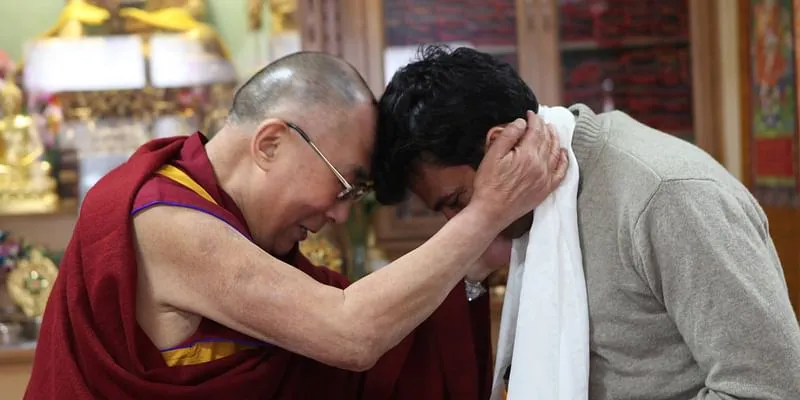
Vikas Khanna with His Holiness the Dalai Lama
It’s true the Michelin-star-rated chef has cooked for and wined and dined with the who’s who of the world; won many accolades and awards for his cooking; authored over 37 books; co-hosted leading cooking shows, and; even ventured into filmmaking, with his debut film, The Last Color, featuring Neena Gupta, which was eligible for Oscars 2020, Best Feature Film.
But, for Vikas, everything he has learnt, endured, or ever achieved so far pales in comparison to the Feed India drive. The overwhelming sense of gratitude and fulfillment he feels at being in a position to give back to his country and help those in need during this crisis is something he has never experienced before.
“This is much bigger than the Michelin star. This is much bigger than everything,” he states.
Edited by Dipti D




